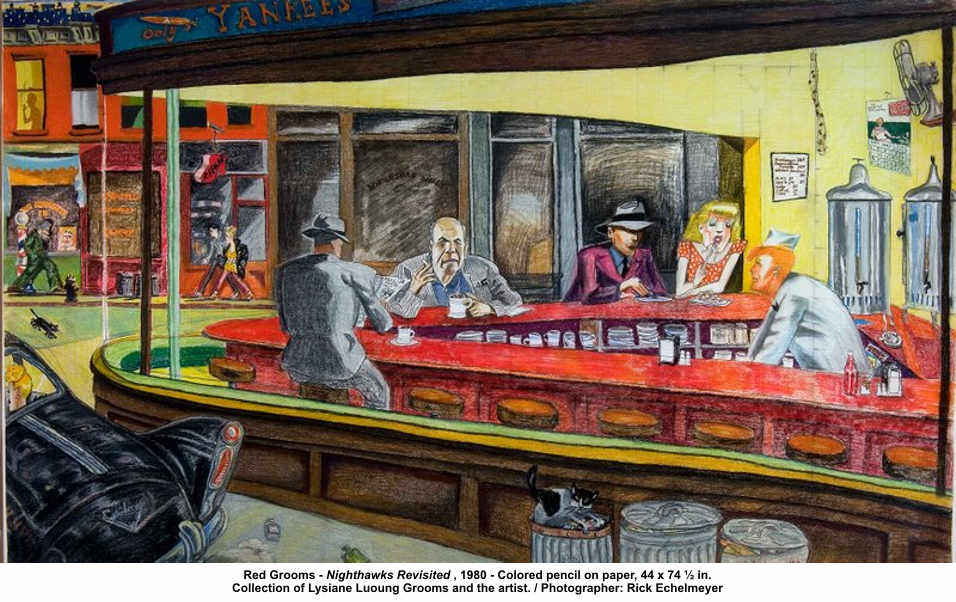 Cavs Archive
Cavs Archive  Quantifiably Insignificant
Quantifiably Insignificant
 It's official. Stats are brutal. And the NBA does not sugarcoat. Laid out online for all to see, Oklahoma rates the coveted "x" (clinched playoff berth); Chicago proudly stands by their "c" (clinched Central division); LA sports a dignified "p" (clinched Pacific division) and Cleveland cowers behind the big zero ("o-Eliminated from contention").
It's official. Stats are brutal. And the NBA does not sugarcoat. Laid out online for all to see, Oklahoma rates the coveted "x" (clinched playoff berth); Chicago proudly stands by their "c" (clinched Central division); LA sports a dignified "p" (clinched Pacific division) and Cleveland cowers behind the big zero ("o-Eliminated from contention").
Much like pre-season games, each match is now quantifiably insignificant. And that's stats for meaningless. With nothing to gain, we risk injury to our psyche and our players. At least the ones not already on the injured list. So where's the motivation for fans and players?
You could argue professional athletes are well paid for an entire season regardless of stats and should earn their salary. On the other hand, you could argue that even a professional bball player who played until they were ninety would never justify a salary that exceeds that of your average CEO.
Motivation for winning teams is easy. But Cleveland is where the rubber meets the road. Why pay to watch at this point? Why play your hardest at this point? Because we are Clevelanders. It is our fate and our merit. Our streets fill with snow. Our lake freezes over. Our city is populated by empty houses and brown fields. We have nowhere else to go, so we keep believing in what we have. Fiercely loyal and protective.
Milton Katz, writing about the American Basketball League (ABL) and the Cleveland Pipers, tells a story involving Pipers' coach John McLendon, owner George Steinbrenner, loyalty and sportsmanship.
Loyalty to his players was also a matter of contention between the owner and the coach. "One time he took one of my players [Grady McCollum] and sold him at halftime to the team we were playing," [said] McLendon ... The Pipers' owner told McCollum that he needed to suit up for the opposition immediately so he could play the second half for [the other team]. According to McLendon, this action left all the players hurt and embarrassed. Upon hearing the news from Steinbrenner, McCollum returned in tears. "I told him he didn't have to play against his teammates," recalled McLendon.
A column by Jack Clowser in the Cleveland Press, entitled "Trouble at Top Endangering Pipers," praised McLendon and the players for their hustle, desire, and drive and at the same time launched a scathing indictment of Steinbrenner's actions.
Fifty years later, roles are reversed as Cleveland's bball idol pulled the emotional equivalent of playing against your own team after halftime, adding nationally televised humiliation into the mix, before heading to South Beach. And this lack of loyalty and common courtesy toward teammates and fans triggered a fury of emotion - hurt feelings, despair, disappointment – which still simmers.
So somewhere between Lynn Swann:
... historically the owners have used loyalty to a team or a city to hold players as opposed to always paying their worth.
and Ayn Rand:
Achievement of your happiness is the only moral purpose of your life, and that happiness, not pain or mindless self-indulgence, is the proof of your moral integrity, since it is the proof and the result of your loyalty to the achievement of your values.
Lies Joyce Maynard's simple truth:
A person who deserves my loyalty receives it.
Like a broken team playing their hardest after all is lost. They may not be playing for a ring this year, but they are still playing for us.
- NBA Announces 2013-2014 Schedule
- Browns Ink Sharknado
- Sharknado A No-Show For Rookie Camp
- Trent Richardson Out Until Training Camp
- Browns Sign Brandon Jackson
- Carrasco Suspended Eight Games
- Browns Add to Wide Receiver Depth with David Nelson
- Browns Need to Learn from Past Draft Mistakes
- Browns Release Chris Gocong and Usama Young
- Browns Missing on Grimes Disappointing, But Not The End
The TCF Forums
- Movies coming out
rebelwithoutaclue (Tuesday, January 21 2014 12:56 PM) - 2015 Recruiting
jclvd_23 (Tuesday, January 21 2014 12:38 PM) - The 2014 Offseason Thread
Larvell Blanks (Tuesday, January 21 2014 12:25 PM) - Official- Browns Coach Search/Rumors
Larvell Blanks (Tuesday, January 21 2014 11:53 AM) - Chris Grant's first 3 drafts
Kingpin74 (Tuesday, January 21 2014 10:13 AM) - Mike Brown
YahooFanChicago (Monday, January 20 2014 11:15 PM) - 2014 Hoops Hockey Hijinx
jpd1224 (Monday, January 20 2014 4:44 PM) - 2014 Recruiting
jclvd_23 (Monday, January 20 2014 2:26 PM) - Wish List - #4 Pick
Hikohadon (Monday, January 20 2014 1:26 PM) - #1 overall pick Anthony Bennett
TouchEmAllTime (Sunday, January 19 2014 1:28 PM)


